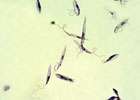Old drug shows new promise to treat leishmaniasis

(Medical Xpress) -- A study published yesterday shows that a drug called fexinidazole could potentially be used to treat visceral leishmaniasis, a parasitic disease that kills 50 000 to 60 000 people a year in Africa, Asia and Latin America.
Fexinidazole, which was originally developed decades ago, has recently been tested in phase I clinical trials for treating human African trypanosomiasis (HAT, also known as sleeping sickness). The parasites that cause HAT and leishmaniasis are closely related, so researchers at the University of Dundee - including scientists at the Wellcome Trust-funded Drug Discovery Unit there - decided to see whether the drug could also work against leishmaniasis.
Their results, published in 'Science Translational Medicine', confirmed that treating mice with fexinidazole reduced the number of leishmaniasis parasites by more than 98 per cent, comparable to current treatments for the disease. However, current treatments have various disadvantages, including cost and the rapid development of drug resistance.
Some current treatments can only be given by injection, which is not practical in poor rural areas where people are at most risk of leishmaniasis, and the only drug that can be given orally cannot be used in women of childbearing age because of the risk of birth defects.
Professor Alan Fairlamb, lead author of the research and co-director of the Drug Discovery Unit, said: "The current treatments are far from ideal, and we need to find better, cheaper and more easily delivered drugs to tackle the disease. Our research suggests that fexinidazole has strong potential to do that.
"Drugs for Neglected Disease initiative (DNDi) have already established that fexinidazole is safe in early clinical trials for African sleeping sickness, so it is some way along the development path."
The next steps for assessing fexinidazole as a treatment for leishmaniasis will be to test it in other animal models and to see how effectively it works against various strains of the parasite that infect people. If the results of those studies are favourable, development of the drug as a new oral treatment for leishmaniasis will be made faster and cheaper because of the ongoing HAT trials.
The research paper cites pharmacologist and Nobel laureate Sir James Black, who said that the most fruitful basis for the discovery of a new drug is to start with an old drug.
"This adage is particularly apt in the search for effective drugs to treat neglected tropical diseases such as visceral leishmaniasis," said Professor Fairlamb. "Indeed, two of the existing antileishmanial drugs, miltefosine and amphotericin B, are examples of medicines originally developed for other purposes - anticancer and antifungal, respectively.
"Our hope is that fexinidazole can follow them and provide relief from a disease that is a major blight across the world."
More information: Wyllie S et al. The anti-trypanosome drug fexinidazole shows potential for treating visceral leishmaniasis. Sci Transl Med 2012 (epub ahead of print).















